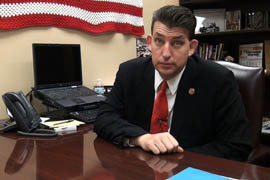Cronkite News has moved to a new home at cronkitenews.azpbs.org. Use this site to search archives from 2011 to May 2015. You can search the new site for current stories.
Lawmaker: Require notarized signatures for early voters
PHOENIX – Requiring Arizonans to have their signatures notarized to get on the permanent early ballot list or to receive early ballots would help prevent voter fraud, a state lawmaker contends.
“When you go into the polls, you show your ID,” said Rep. Carl Seel, R-Phoenix. “Every time you go into the polls, you show your ID. Well, if you’re going to vote by mail you’re not walking into the poll, so shouldn’t you have the same safeguards in place?”
Seel said that the increase in people voting by mail prompted him to introduce HB 2350.
“My bill is really almost a clean-up; that is, it stays consistent with that belief that anyone who votes truly should be authorized to vote,” he said.
Seel’s bill was scheduled for a hearing Thursday before the House Judiciary Committee, but he withdrew it after hearing concerns from Secretary of State Ken Bennett and county election officials.
An investigation last year by News21, a national reporting consortium made up of 11 universities and hosted at Arizona State University, found that voter fraud is rare across the country. In Arizona, seven cases of alleged election fraud had reached a courtroom since 2000. Four of those cases involved people accused of voting twice.
In September, Bennett cited nine new cases of suspected voter fraud. Most of them involved people voting in more than one state.
In an interview, Bennett said he opposes Seel’s bill.
“We are very concerned and do not support requiring citizens who already told the counties that they want to receive their ballot by mail, to require those voters to now have to go back and re-establish that request and get it notarized,” Bennett said.
However, Bennett said there is other legislation that may help address counties’ challenges in maintaining permanent early voter lists. An analysis by Maricopa County, for example, found that confusion by voters on that list led to many of the record number of provisional ballots cast in November.
Linda Weedon, deputy director of elections for Maricopa County, said in a telephone interview that the bill could create a burden for voters as well as a financial burden on counties.
“It’s not an easy thing, going out and getting a notary for your signature,” Weedon said.
Barbara Klein, president of the League of Women Voters of Arizona, attended the hearing and was pleased that Seel held the bill. She said the change he’s proposing would be “an incredible hardship” on voters.
“It’s going to be difficult for everybody, but especially for the poor and disadvantaged,” she said.
Sam Wercinski, executive director of the Arizona Advocacy Network, said his group rallied people to oppose the bill in calls to House Judiciary Committee members, the Secretary of State’s Office and county election offices.
He said that in practice the bill would force volunteers who register voters and help them get on the permanent early voting list to become notaries, an expensive task.
“Requiring them to be notaries is just big government at its worst,” Wercinski said.
Seel said he planned to try again with the bill after talking with Bennett’s office and county election officials.







